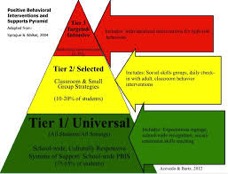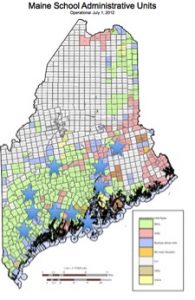Maine Schools in Focus: Positive Behavior Intervention and Supports—Statewide Professional Development in Maine
Courtney Angelosante, Lecturer in Special Education/University of Maine
School climate and student behavior continue to be a significant concern for educators. Teachers and leaders are under increasing pressure to ensure that students reach high standards within a safe and supportive learning environment. As a result, there is a high demand for professional development targeting evidence-based approaches to creating positive school climates. This increasing focus on school climate has many benefits, because it provides the foundation for student outcomes our communities are deeply vested in. Positive climates are associated with:
- Lower levels of student discipline referrals
- Lower rates of suspension and expulsion
- Lower levels of drug and alcohol use
- Lower levels of harassment
- Promotion of engagement and motivation
- Improved attendance
- Improvements in academic achievement
The good news is that much is known about how to foster positive school climates to promote positive behavioral growth and bolster academic engagement. The impact of Positive Behavior Support and Intervention (PBIS) on school climate and student behavior has been demonstrated on a national level over the past 15 years. Due to the substantial progress in implementation and impact, PBIS boasts the longest-running federally funded technical assistance center: www.pbis.org.
Based on the community health prevention model, PBIS is a multi-tiered system of support for establishing the social culture of a school and a continuum of behavioral supports needed to ensure the success of all students (Walker et al., 1996). This model has multiple tiers, with the first tier providing universal behavioral support focused on the prevention of challenging behavior. The following are the key components of Tier One:
- Defining and teaching behavioral expectations
- Acknowledging appropriate student behaviors
- Establishing a continuum of equitable and predictable consequences for problem behavior
 Collecting data about student behaviors to support data-based problem solving
Collecting data about student behaviors to support data-based problem solving
When schools establish these components, it is expected to have approximately 80% of students responding favorably, leaving roughly 20% of students needing additional support. The second tier includes efficient, group-oriented interventions that provide students with increased structure, additional teaching, practice opportunities, and specific feedback on their performance. It is anticipated that when tiers one and two are implemented with fidelity and students’ needs are effectively addressed, there will remain a need to support approximately 5% of students at the tier three level, which typically involves additional assessment and individualized support.
Spotlight on Maine’s Efforts
In 2015 at a Maine Administrators of Services for Children with Disabilities (MADSEC) conference, several Maine district personnel voiced an interest in PBIS to support their schools in meeting the needs of students presenting with behavioral challenges. A collaborative effort between the Maine Department of Education (MDOE) and the University of Maine System (UMS) was formed to support schools.
 The MDOE/UMS collaboration was able to initiate the exploration, adoption, and implementation of PBIS in 42 schools across the state, during the 2016-17 school year.
The MDOE/UMS collaboration was able to initiate the exploration, adoption, and implementation of PBIS in 42 schools across the state, during the 2016-17 school year.
Three UMS faculty provided professional development and coaching, Courtney Angelosante and Jim Artesani, University of Maine, Brian Cavanaugh, University of Maine at Farmington, and Pat Red, University of Southern Maine. Coaching included the following components:
- Assessment for action planning
- Targeted district/school wide professional development based on assessments
- Technical assistance at PBIS meetings
- Assistance developing 3-5 year district goals for PBIS implementation
- Professional development and technical assistance on School-wide Information Systems (SWIS)
- Training local coaches in PBIS practices
- Development of a state-wide PBIS coach training and network
Measuring Implementation Outcomes
The fidelity of implementation is related to valued student outcomes, for students cannot benefit from the prevention and intervention they do not receive. PBIS has the following valid and reliable assessments to measure schools’ level of implementation, which allows for action planning and targeting areas for professional development:
- Schoolwide Evaluation Tool (SET): An annual evaluation designed to assess the critical features of schoolwide behavior supports (Horner et al., 2004)
- Tiered Fidelity Inventory (TFI): A measure of the extent features and supports implemented across multiple tiers to guide action planning (Alogozzine, et al., 2014)
- Team Implementation Checklist (TIC): Quarterly assessment to monitor activities for PBIS implementation (Sugai, Horner, Lewis-Palmer, 2001)
Schools are also encouraged to collect and analyze multiple sources of data to identify levels of student risk leading to early intervention, including the following:
- Office Discipline Referrals
- Attendance Data
- Student Achievement Data
- Universal Screening Data
- Parent, Teacher, Student Referrals
MDOE/UMS continue to support PBIS in Maine, and are analyzing data from year one of this project. Next steps for Maine are to explore avenues to scale-up capacity for coaching to bring support to interested schools throughout Maine.
Sources:
Alogozzine, B., Barrett, S., Eber, L., George, H., Horner, R., Lewis, T., Butman, B., Swain-Bradway, J., McIntosh, K., & Sugai, G., (2014). School-wide PBIS Tiered Fidelity Inventory. OSEP Technical Assistance Center on Positive Behavioral Interventions and Supports.
Horner, R. H., Todd, A. W., Lewis-Palmer, T., Irvin, L. K., Sugai, G., & Boland, J. B. (2004). The school-wide evaluation tool (SET) a research instrument for assessing school-wide positive behavior support. Journal of Positive Behavior Interventions, 6(1), 3-12.
Sugai, G., Horner, R. H., & Lewis-Palmer, T. L. (2001). Team implementation checklist (TIC). Unpublished instrument, University of Oregon, Eugene, OR.
Walker, H. M., Horner, R. H., Sugai, G., Bullis, M., Sprague, J. R., Bricker, D., & Kaufman, M. J. (1996). Integrated approaches to preventing antisocial behavior patterns among school-age children and youth. Journal of emotional and behavioral disorders, 4(4), 194-209.
Any opinions, conclusions, or recommendations expressed in the Maine Schools in Focus briefs are those of the authors and do not necessarily reflect institutional positions or views of the College of Education and Human Development or the University of Maine.
